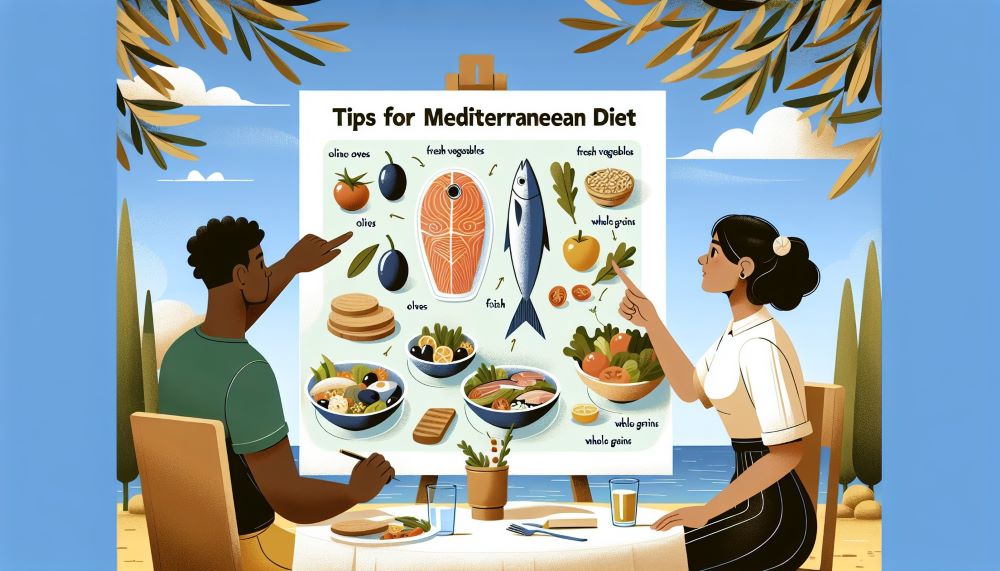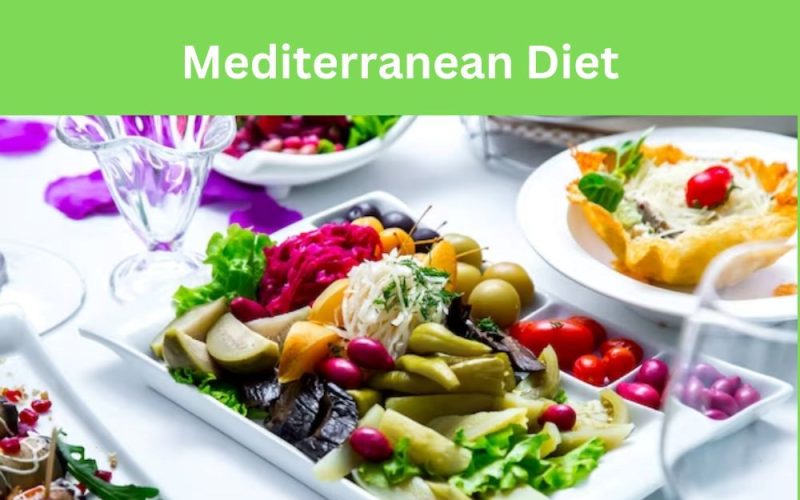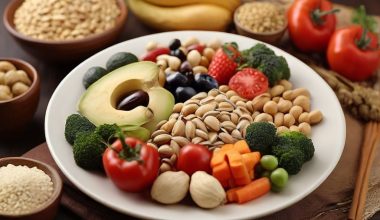The Mediterranean Diet emphasizes plant-based foods, lean proteins, and healthy fats. It originates from the traditional eating habits of Mediterranean countries.
Embracing the Mediterranean Diet offers a flavorful approach to healthy eating. Rich in vegetables, fruits, whole grains, and heart-healthy fats like olive oil, this diet prioritizes nutrition and satisfaction. Seafood, poultry, beans, and eggs provide lean protein, while red meat and sweets are limited to maintain balance.
This diet is not only about food choices but also includes lifestyle factors such as enjoying meals with family and engaging in regular physical activity. Studies suggest that following this diet can lead to improved heart health, weight loss, and a reduction in the risk of chronic diseases.�
The Mediterranean Diet is renowned for its benefits and ease of incorporation into daily life, making it an appealing option for many seeking a sustainable and enjoyable way to eat healthily.
The Origins Of The Mediterranean Diet
The Mediterranean Diet stands as a hallmark of healthy eating, rich in history and flavor. With roots tracing back thousands of years, it embodies the culinary traditions of people living along the Mediterranean Sea.
The diet focuses on whole grains, fresh fruits and vegetables, lean proteins, and heart-healthy fats, woven into the fabric of cultural customs and local ingredients.
Rooted In Tradition
Time-honored practices have shaped the Mediterranean Diet for generations. It’s more than a way of eating; it’s a lifestyle deeply intertwined with community and the rhythm of the seasons. Originally, the diet naturally emerged from the agricultural patterns and coastal resources available to ancient civilizations in the region.
- Olive oil – a staple fat used for cooking and dressings
- Seafood – caught locally and served regularly
- Seasonal produce – harvested at peak ripeness for maximum flavor
- Herbs and spices – gathered wild or grown in home gardens
Regional Variations
The diet is diverse and flexible, influenced by the distinct cultures and landscapes across the Mediterranean basin. While the core principles remain consistent, flavors and specific ingredients vary.
Certainly! Here’s the information presented in a table format:
| Region | Key Ingredients |
| Italy | Pasta, tomatoes, basil |
| Greece | Feta cheese, olives, oregano |
| North Africa | Couscous, dates, mint |
| Middle East | Lentils, figs, za’atar |
Each locale adds its own signature, creating a rich tapestry of dishes that are both distinct and harmonious with the diet’s philosophy. This regional diversity is key in what makes the Mediterranean Diet both adaptable and sustainable, resonating with people all around the globe.
Key Components Of The Mediterranean Lifestyle

Embrace a healthier lifestyle with the key components of the Mediterranean diet. This eating pattern emphasizes fresh, nutritious foods and hearty flavors.
Let’s explore the essentials of this lifestyle:
A Plant-based Approach
The Mediterranean diet centers around plants.
- Fruits and vegetables fill your plate with color and nutrients.
- Whole grains offer energy and fiber.
- Nuts and seeds provide healthy fats and protein.
- Legumes are key for texture and added benefits.
The Role Of Olive Oil
- Olive oil is the heart of Mediterranean cooking.
- It replaces other fats like butter and margarine.
- It’s packed with monounsaturated fats, known for their health perks.
- Use it in dressings, for cooking, or as a dip for bread.
Seafood And Poultry
Seafood and poultry take a leading role over red meat.
| Fish | Frequency |
| Salmon | Twice a week |
| Tuna | Once a week |
Poultry like chicken and turkey offer lean protein. They should be cooked using healthy methods like grilling or baking.
Benefits Linked To The Mediterranean Diet
Credit: www.today.com
The Mediterranean Diet is famous around the world. Its rich flavors come from fruits, vegetables, nuts, and olive oil. Doctors and nutritionists praise this diet. It offers many health perks. Those who follow it tend to lead longer and healthier lives. Let’s explore these benefits below.
Heart Health Advantages
The heart loves the Mediterranean Diet. This diet is low in processed foods and sugar. It includes healthy fats from fish and olive oil. These can help lower bad cholesterol. A table of benefits might include:
| Benefit | Food Source |
| Reduced blood pressure | Leafy greens, olives |
| Better cholesterol levels | Nuts, fish |
| Lower heart disease risk | Whole grains, fruits |
Weight Management
Maintaining a healthy weight gets easier. The Mediterranean Diet is not about strict calorie counting. It’s about eating whole, unprocessed foods. Benefits include:
- Feeling full longer with high-fiber foods
- Less snacking on sugary treats
- Steady weight loss over time
Cognitive Function Preservation
Keeping the brain sharp is important. The Mediterranean Diet may slow down aging in the brain. Rich in antioxidants, it combats damage from free radicals. Let’s highlight the key points:
- Better memory
- Olive oil and berries improve brain function.
- Reduced risk of Alzheimer’s
- Fish provides Omega-3s that protect the brain.
- Enhanced mood
- Whole grains can help manage stress hormones.
Mediterranean Recipes and Meal Planning

Welcome to the vibrant world of Mediterranean recipes and meal planning. This diet boasts a rich tapestry of flavors and heart-healthy ingredients. From sun-ripened vegetables to fresh seafood, the Mediterranean diet is about enjoying wholesome, unprocessed foods.
It stands as a nutritionist-approved path to a healthful lifestyle. Let’s explore traditional dishes and learn to create a balanced weekly meal plan.
Examples Of Traditional Dishes
Delicious Mediterranean dishes come from fresh, simple ingredients. Let’s discover some favorites:
- Grilled Fish: Drizzled with olive oil and lemon juice, it’s a classic dish.
- Tabbouleh: A refreshing salad, with bulgur, tomatoes, and parsley.
- Moussaka: A hearty eggplant and lamb casserole.
- Hummus: A creamy spread made from chickpeas and tahini.
- Ratatouille: A vegetable stew, starring zucchini, peppers, and eggplant.
Creating A Weekly Meal Plan
Planning meals for the week is straightforward. Here’s how to do it:
- Pick a variety of dishes from the traditional list above.
- Include daily salads for a fresh, nutrient-packed side.
- Go for whole grains like quinoa or farro.
- Add protein with beans, lentils, or lean meats.
| Day | Meal |
| Monday | Grilled fish with quinoa salad |
| Tuesday | Lentil soup with whole grain bread |
| Wednesday | Roasted chicken with ratatouille |
| Thursday | Hummus with mixed vegetable sticks |
| Friday | Tabbouleh with grilled halloumi cheese |
| Saturday | Baked eggplant moussaka |
| Sunday | Leftovers or your choice of a Mediterranean dish |
This plan ensures a balanced, nutritious diet throughout the week. You’ll enjoy delicious flavors while taking care of your health. Remember to adjust servings based on individual needs and preferences. Healthy eating should always align with personal goals and lifestyle.
Incorporating The Mediterranean Diet Into Your Life
Embracing the Mediterranean Diet offers a delicious and healthy lifestyle shift. Rich in vegetables, fruits, whole grains, and healthy fats, it’s no wonder it’s acclaimed for its benefits. Dive right in with these accessible steps to seamlessly blend the Mediterranean Diet into your daily routine.
Tips For Beginners

To start, focus on simple changes:
- Whole Grains and Fiber:Switch to whole grains like brown rice, quinoa, whole wheat, and oats. These provide more fiber, keeping you full and aiding digestion.
- Fruits and Vegetables: Aim for a rainbow of colors on your plate with a variety of fruits and vegetables. They’re rich in vitamins, minerals, and antioxidants, essential for a 30-day diet plan.
- Healthy Fats: Opt for sources of healthy fats such as olive oil, avocados, nuts, and seeds. These fats are beneficial for heart health and can be used in cooking or as toppings.
- Lean Proteins: Choose lean protein sources like fish, poultry, tofu, legumes, and beans. These options are lower in saturated fat and provide essential amino acids.
- Portion Control: Be mindful of portion sizes to avoid overeating. Use smaller plates, and listen to your body’s hunger and fullness cues.
- Hydration: Drink plenty of water throughout the day. Consider replacing sugary drinks with water, herbal teas, or infused water for added flavor.
- Limit Processed Foods: Minimize intake of processed and packaged foods, which often contain added sugars, salt, and unhealthy fats. Opt for whole, unprocessed foods whenever possible.
- Meal Planning: Plan your meals and snacks in advance to ensure a balanced and nutritious diet. This can help you make healthier choices and avoid last-minute, less healthy options.
- Mindful Eating: Practice mindful eating by savoring each bite, chewing slowly, and paying attention to hunger and fullness cues. This can prevent overeating and promote a healthier relationship with food.
- Regular Physical Activity: Incorporate regular exercise into your routine, whether it’s walking, jogging, cycling, or participating in fitness classes. Find activities you enjoy to make it a sustainable habit.
- Quality Sleep: Prioritize getting enough quality sleep each night. Lack of sleep can affect your metabolism and make it harder to make healthy choices throughout the day.
- Social Connection: Enjoy meals with others whenever possible. Sharing food with family or friends not only enhances the dining experience but also promotes a sense of community and connection.
Adapting To Various Dietary Needs
The Mediterranean Diet is flexible. Here’s how to tailor it:
| Dietary Need | Adaptations |
| Gluten-Free | Use gluten-free grains like buckwheat or amaranth. |
| Low-Sodium | Flavor food with herbs and lemon instead of salt. |
| Vegetarian | Focus on beans, nuts, and seeds for protein. |
| Dairy-Free | Opt for almond or coconut milk over cow’s milk. |
Research And Evidence
The Mediterranean Diet has been the focus of extensive research over the years. Many scientists have studied how this way of eating affects health. Experts around the world recommend it for maintaining a healthy lifestyle. Let’s explore the solid evidence backing this diet’s numerous benefits.
Scientific Studies Supporting The Diet
Evidence about the Mediterranean Diet comes from both clinical trials and observational studies. These scientific studies highlight the diet’s effectiveness. Here’s what they show:
- Reduced risk of heart disease
- Lower cholesterol levels
- Better blood sugar control in diabetes
- Decreased chance of Alzheimer’s and Parkinson’s
- Support in weight loss endeavors
One notable study is the PREDIMED trial, which followed participants for nearly five years. It found that the Mediterranean Diet, especially when rich in olive oil or nuts, reduced heart disease risk by nearly 30%.
Comparisons With Other Diets
When stacked against other diets, the Mediterranean Diet often comes out on top. Researchers have compared it to low-fat diets, the American dietary guidelines, and more.
Mediterranean Diet vs. Paleo Diet:
Mediterranean Diet: Includes a wide variety of foods, with an emphasis on whole grains, fruits, vegetables, and healthy fats. Allows for moderate consumption of lean meats, fish, and dairy.
Paleo Diet: Focuses on foods presumed to have been available to our ancestors, such as lean meats, fish, fruits, vegetables, nuts, and seeds. Excludes dairy, grains, and processed foods.
Mediterranean Diet vs. Keto Diet:
Mediterranean Diet: Moderate in all macronutrients, with an emphasis on healthy fats, including olive oil. Includes a balance of carbohydrates from fruits, vegetables, and whole grains.
Keto Diet: Very low in carbohydrates, high in fat, and moderate in protein. Promotes a state of ketosis, where the body uses fat for fuel.
Mediterranean Diet vs. DASH Diet:
Mediterranean Diet: Emphasizes a variety of nutrient-dense foods, including fruits, vegetables, whole grains, and healthy fats. Includes moderate amounts of lean protein, particularly from fish.
DASH Diet (Dietary Approaches to Stop Hypertension): Focuses on reducing sodium intake to manage blood pressure. Emphasizes fruits, vegetables, lean protein, and low-fat dairy.
Mediterranean Diet vs. Vegetarian/Vegan Diet:
Mediterranean Diet: Includes animal products like fish, poultry, and dairy in moderation. Emphasizes plant-based foods and healthy fats.
Vegetarian/Vegan Diet: Excludes animal products entirely (vegan) or includes some animal products like dairy and eggs (vegetarian). Focuses on plant-based foods for nutrition.
Studies show this diet’s superiority in promoting long-term health and sustainability. It includes a variety of foods, which helps people stick to the diet.
Cultural Significance And Sustainability
The Mediterranean Diet stands as a beacon of healthy living, rich flavors, and deep-rooted traditions. It reflects a way of life honed over centuries in regions bathed by the Mediterranean Sea.�
With an emphasis on plant-based foods, whole grains, and lean proteins, this diet boasts benefits extending beyond nutrition. It’s a symbol of cultural identity and ecological awareness.�
Explore how the diet preserves ancient practices while promoting a sustainable future.
Preserving Cultural Heritage
The Mediterranean Diet is a tapestry woven with timeless culinary customs. It is more than just a list of foods; it’s a living legacy.
- Family Recipes: Passed down through generations, each dish is a story.
- Local Festivals: Communities celebrate their heritage with food at the center.
- Ancient Techniques: Traditional farming and cooking methods endure.
These practices enrich the social fabric and strengthen bonds within communities.
Environmental Impact
The Mediterranean Diet’s foundation on seasonal and local produce has positive environmental effects. Let’s look at its eco-friendly attributes:
| Attribute | Benefit |
| Reduced Meat Consumption | Lower greenhouse gas emissions |
| Seasonal Eating | Supports biodiversity and reduces transportation |
| Local Sourcing | Boosts local economies and minimizes food miles |
Embracing this diet helps protect our planet for future generations.
Credit: oldwayspt.org
Frequently Asked Questions About the Mediterranean Diet�
What is the Mediterranean Diet?�
The Mediterranean Diet is a heart-healthy eating plan. It emphasizes fruits, vegetables, whole grains, and healthy fats. It includes moderate amounts of fish and poultry. Red meat and sweets are limited. Olive oil is a key component.
What Foods are on the Mediterranean Diet?
The diet is rich in plant-based foods, such as fruits, vegetables, whole grains, legumes, and nuts. It includes fish, seafood, and poultry, with limited red meat. Olive oil replaces butter, and herbs and spices add flavor instead of salt.
Are Eggs Allowed on the Mediterranean Diet?
Yes, eggs are allowed in moderation on the Mediterranean Diet. They provide high-quality protein and are commonly eaten in various dishes, though not as the main protein source.
How Does the Mediterranean Diet Benefit Health?
The Mediterranean Diet benefits heart health, reduces the risk of cardiovascular disease, and may help with weight management. It’s linked to a lower risk of diabetes and certain types of cancer. The diet also supports brain health and longevity.
Conclusion
In conclusion, the Mediterranean Diet is a proven, health-boosting lifestyle rooted in the culinary traditions of the Mediterranean region. Emphasizing plant-based foods, lean proteins, and heart-healthy fats, it offers a flavorful and adaptable approach to well-being. Backed by scientific studies, this diet promotes heart health, weight management, and cognitive function.�
Beyond nutrition, its cultural significance preserves heritage and supports eco-friendly practices. Adopting the Mediterranean Diet involves simple changes for a healthier, revitalized lifestyle.�
Start your journey today for a tastier, healthier tomorrow. “Buon Appetito e Buona Salute!” (Good Appetite and Good Health!)







